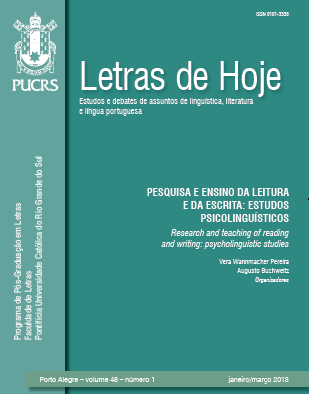Words/pseudowords writing task for adults: a cognitive neuropsychology approach
Keywords:
Writing, Cognitive neuropsychology, DysgraphiaAbstract
This article presents the construction process of a word/pseudoword writing task for adults, based on the approach of cognitive neuropsychology. The construction process involved six steps: 1) selection of psycholinguistic criteria, 2) selection of the stimuli for the task, 3) revision of the first version by expert judges, 4) reformulations according to judge’s suggestions and construction of the second version of task; 5) analysis of the new version by previous judges, 6) definition of the final version of the task. Were included 72 stimuli divided into frequent words (24) non frequent words (24) and 24 pseudowords. Each group was composed by regular, irregular, short and long stimuli. The purpose of this task is to contribute to the cognitive neuropsychological assessment of acquired and development dysgraphias, as well as to characterize the writing profile of clinical groups and healthy adults with different sociodemographic characteristics.Downloads
Downloads
Published
How to Cite
Issue
Section
License
Copyright
The submission of originals to Letras de Hoje implies the transfer by the authors of the right for publication. Authors retain copyright and grant the journal right of first publication. If the authors wish to include the same data into another publication, they must cite Letras de Hoje as the site of original publication.
Creative Commons License
Except where otherwise specified, material published in this journal is licensed under a Creative Commons Attribution 4.0 International license, which allows unrestricted use, distribution and reproduction in any medium, provided the original publication is correctly cited.






